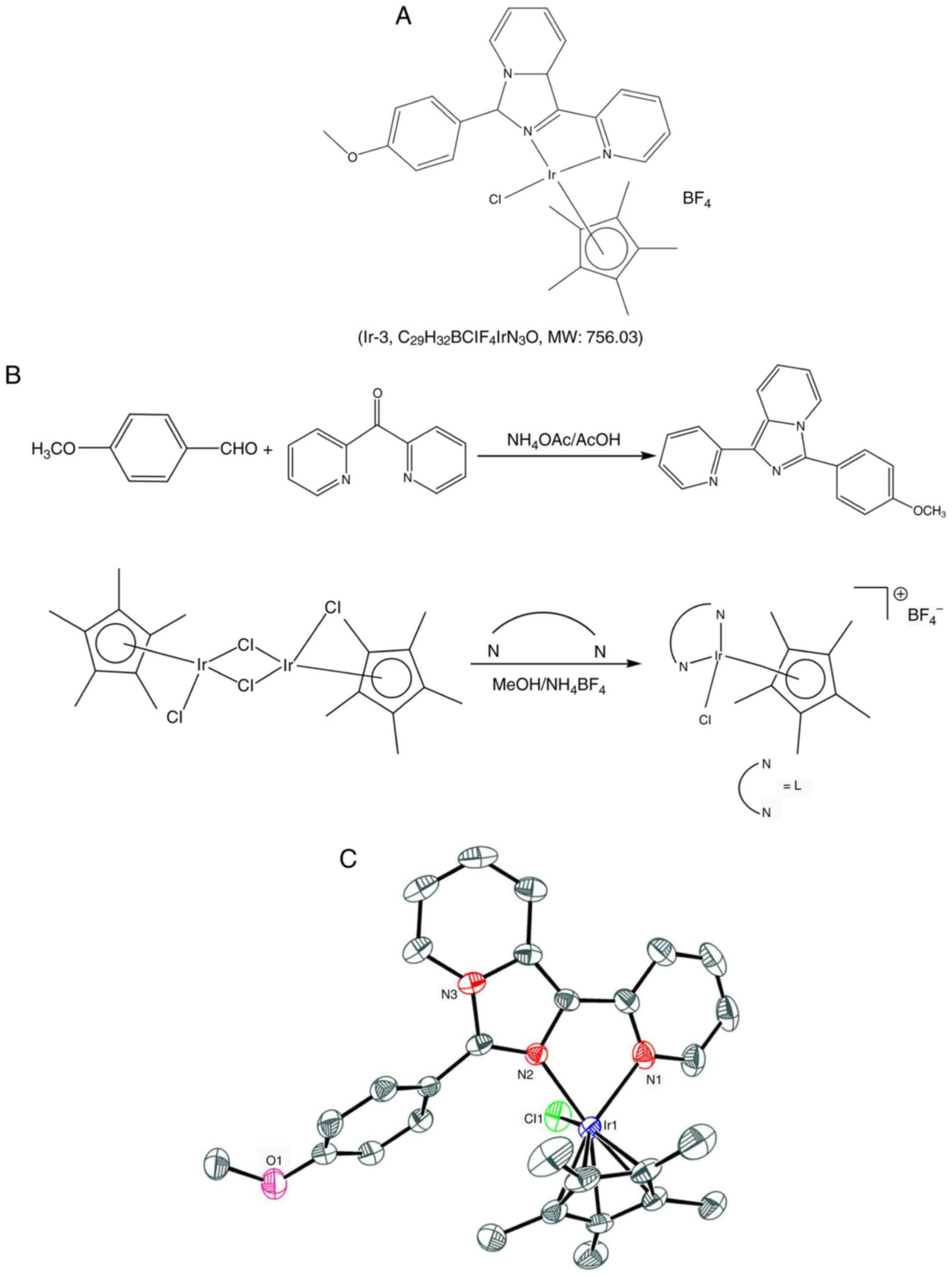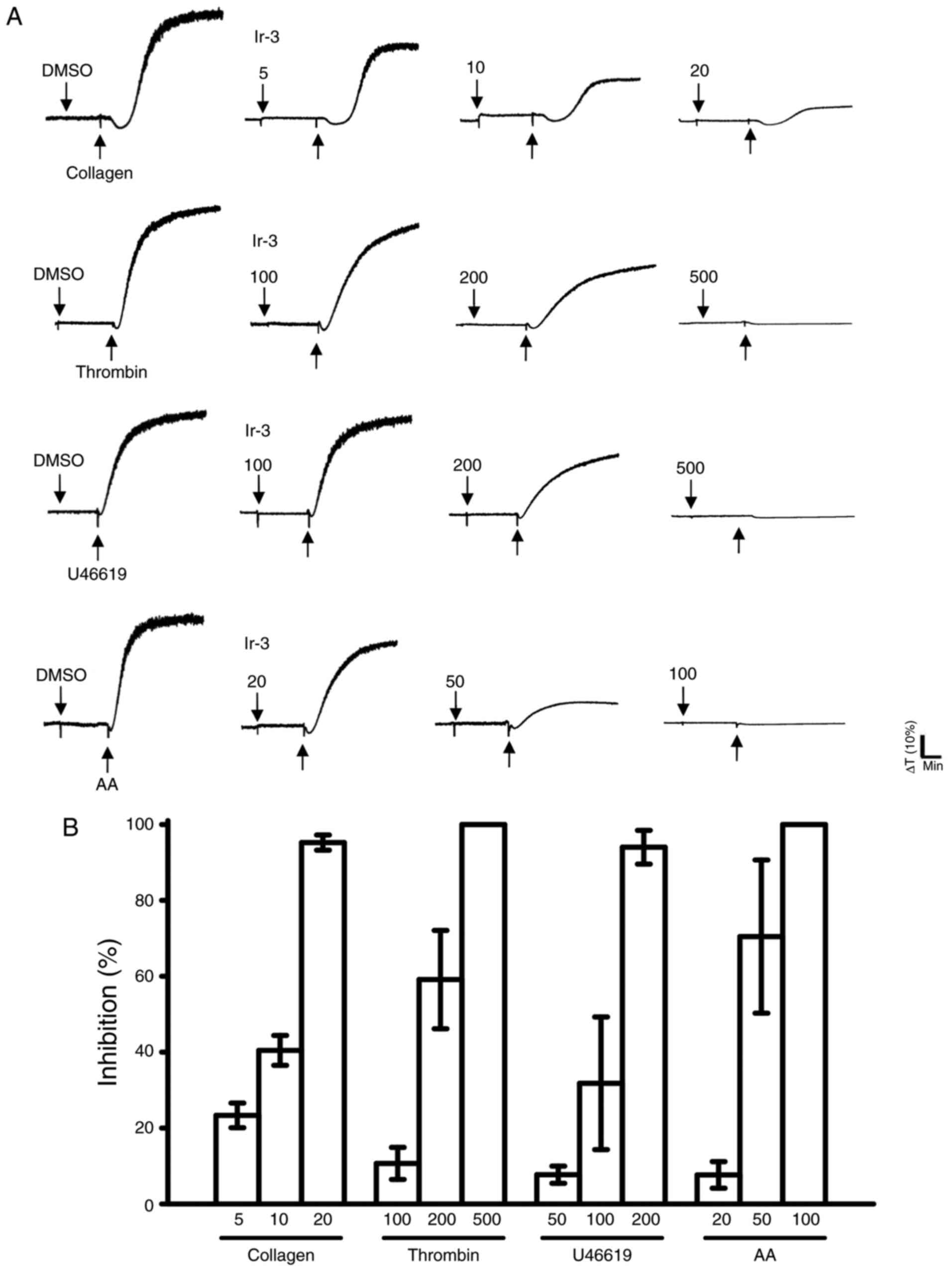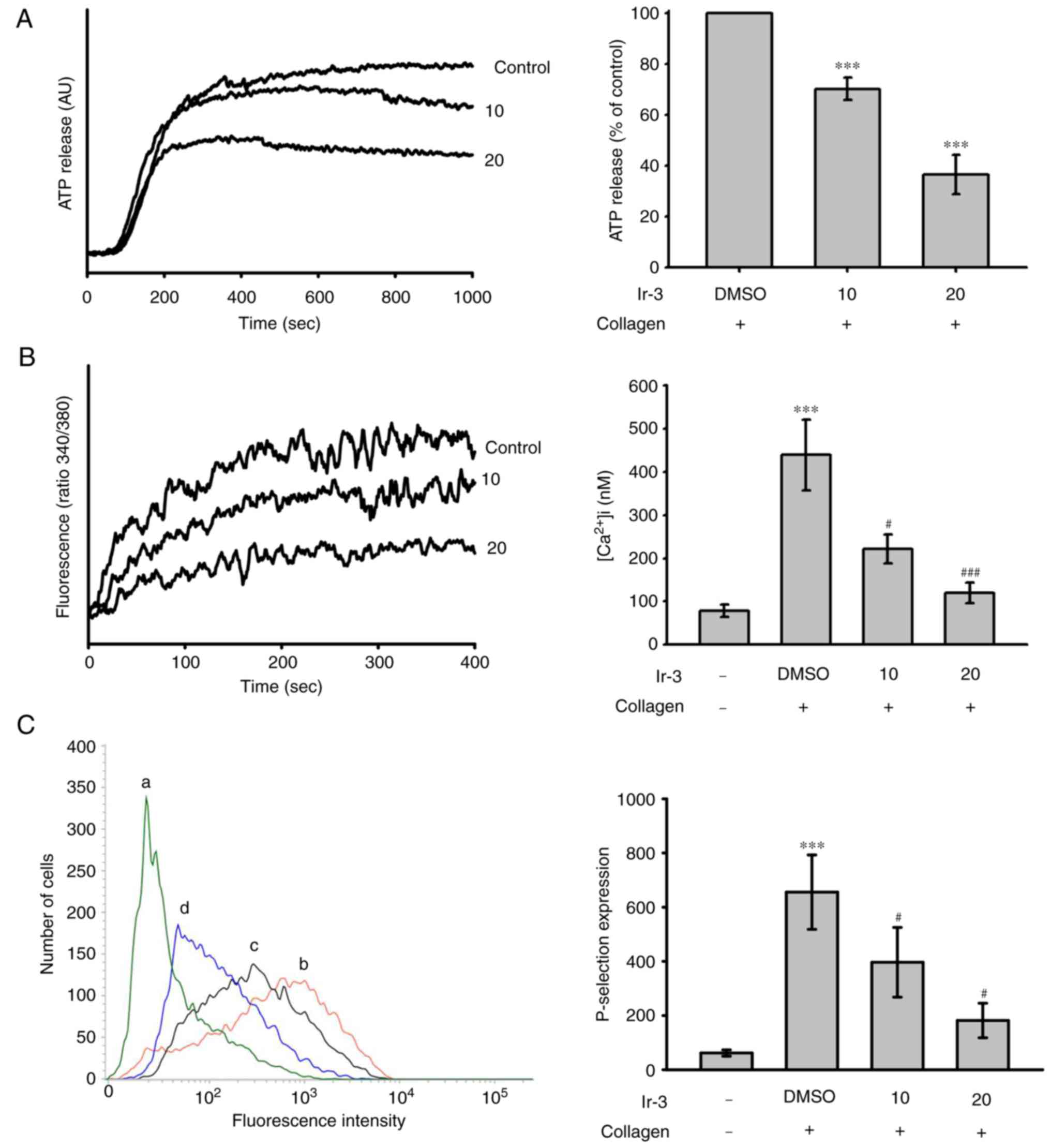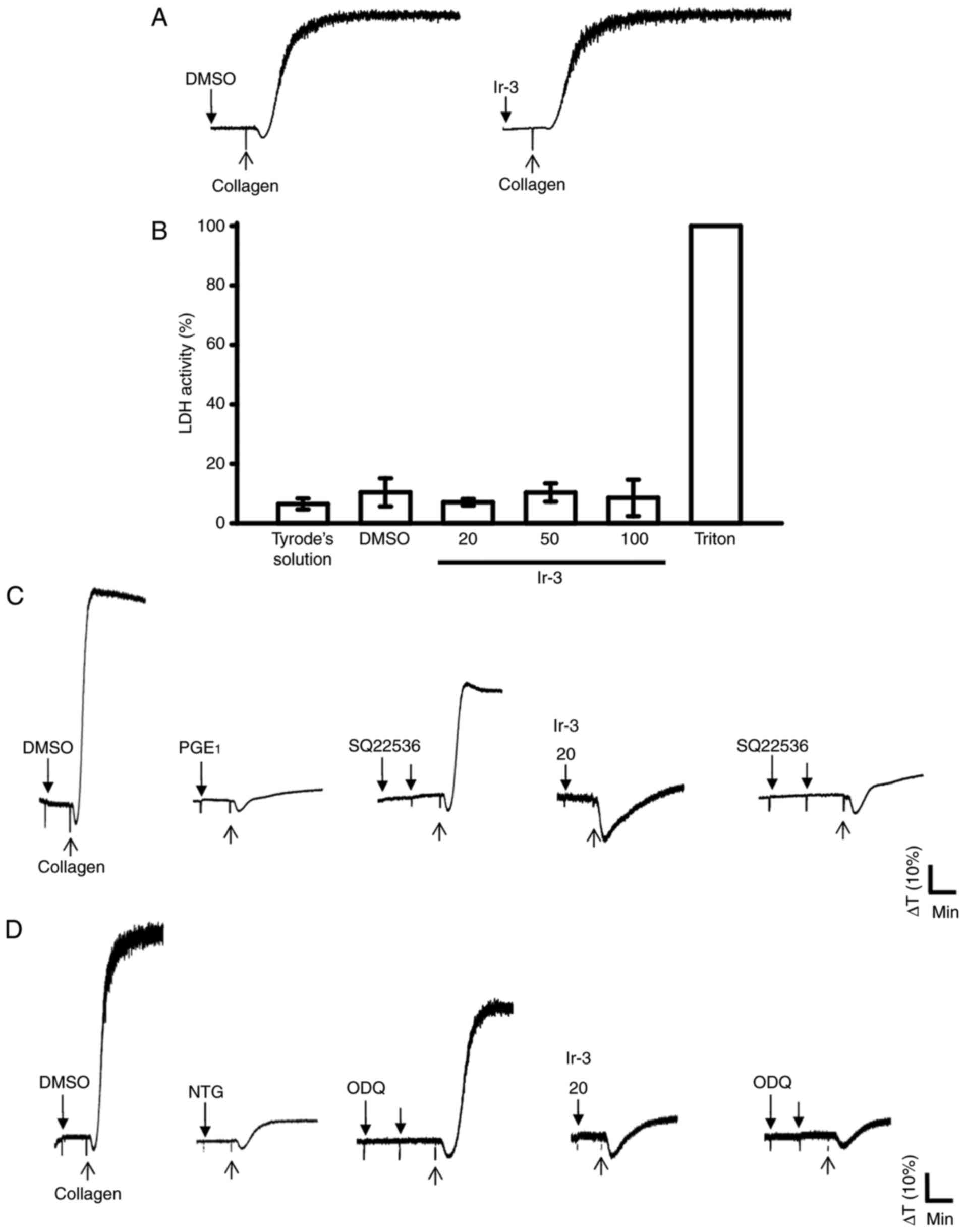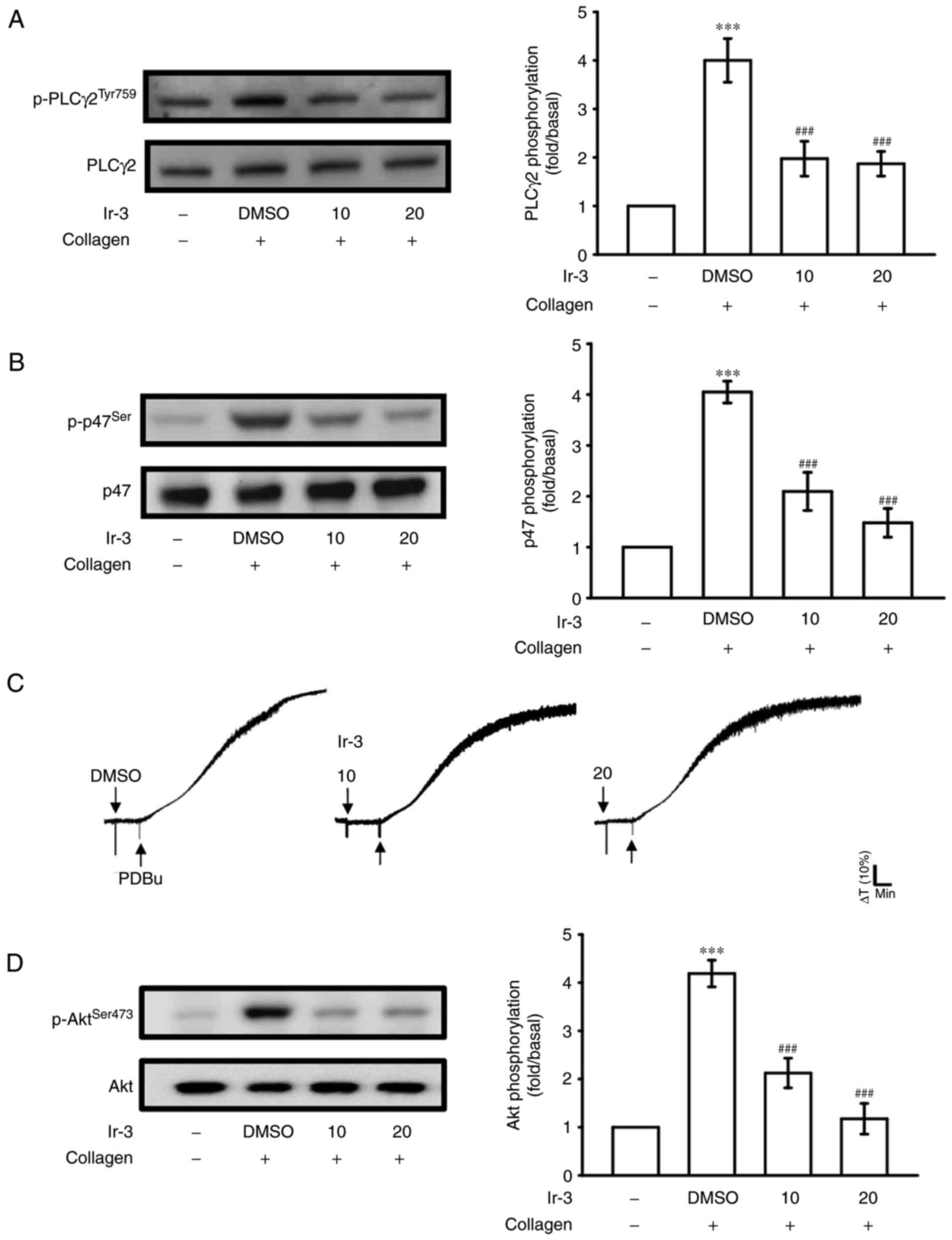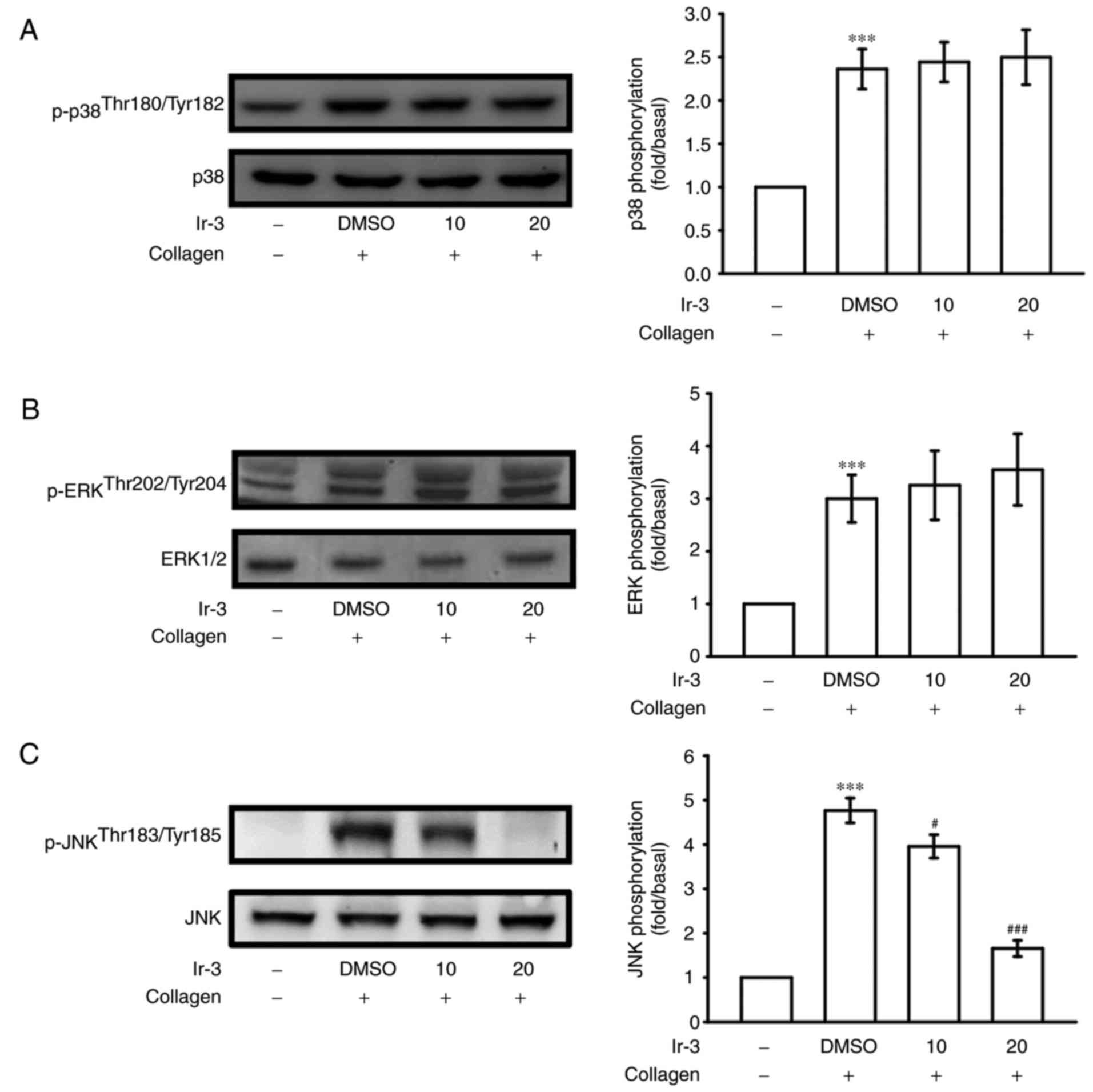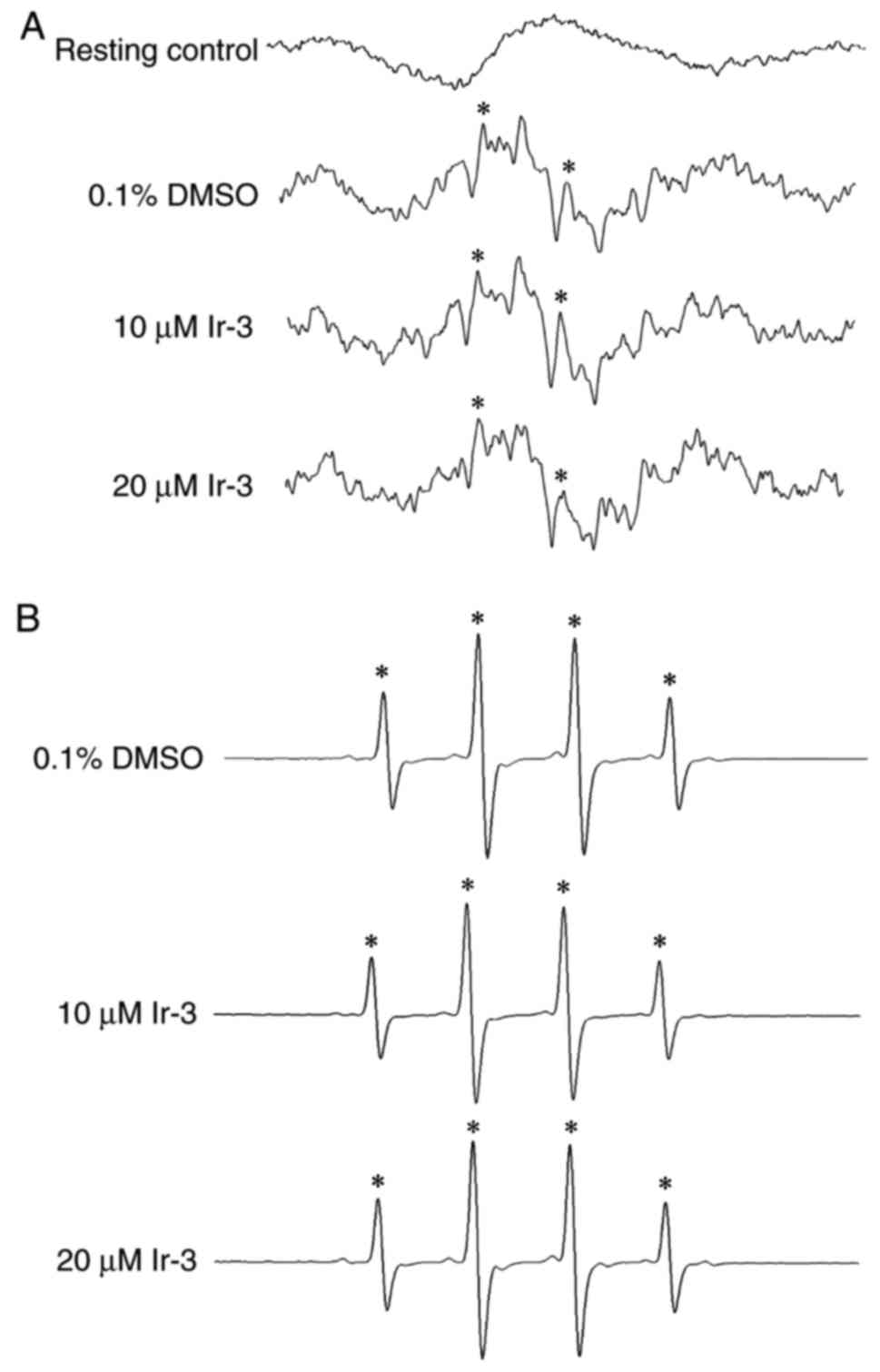|
1
|
Jayakumar T, Yang CH, Geraldine P, Yen TL
and Sheu JR: The pharmacodynamics of antiplatelet compounds in
thrombosis treatment. Expert Opin Drug Metab Toxicol. 12:615–632.
2016. View Article : Google Scholar : PubMed/NCBI
|
|
2
|
Belloc C, Lu H, Soria C, Fridman R,
Legrand Y and Menashi S: The effect of platelets on invasiveness
and protease production of human mammary tumor cells. Int J Cancer.
60:413–417. 1995. View Article : Google Scholar : PubMed/NCBI
|
|
3
|
Felding-Habermann B, Ooole TE, Smith JW,
Fransvea E, Ruggeri ZM, Ginsberg MH, Hughes PE, Pampori N, Shattil
SJ, Saven A, et al: Integrin activation controls metastasis in
human breast cancer. Proc Natl Acad Sci USA. 98:1853–1858. 2001.
View Article : Google Scholar : PubMed/NCBI
|
|
4
|
Boucharaba A, Serre CM, Gres S,
Saulnier-Blache JS, Bordet JC, Guglielmi J, Clezardin P and
Peyruchaud O: Platelet-derived lysophosphatidic acid supports the
progression of osteolytic bone metastases in breast cancer. J Clin
Invest. 114:1714–1725. 2004. View Article : Google Scholar : PubMed/NCBI
|
|
5
|
Iavicoli I, Cufino V, Corbi M, Goracci M,
Caredda E, Cittadini A, Bergamaschi A and Sgambato A: Rhodium and
iridium salts inhibit proliferation and induce DNA damage in rat
fibroblasts in vitro. Toxicol In Vitro. 26:963–969. 2012.
View Article : Google Scholar : PubMed/NCBI
|
|
6
|
Iavicoli I, Fontana L, Marinaccio A,
Alimonti A, Pino A, Bergamaschi A and Calabrese EJ: The effects of
iridium on the renal function of female wistar rats. Ecotoxicol
Environ Safe. 74:1795–1799. 2011. View Article : Google Scholar
|
|
7
|
Romero-Canelón I and Sadler PJ:
Next-generation metal anticancer complexes: Multitargeting via
redox modulation. Inorg Chem. 52:12276–12291. 2013. View Article : Google Scholar : PubMed/NCBI
|
|
8
|
Yellol J, Pérez SA, Buceta A, Yellol G,
Donaire A, Szumlas P, Bednarski PJ, Makhloufi G, Janiak C, Espinosa
A and Ruiz J: Novel C, N-cyclometalated benzimidazole ruthenium(II)
and iridium(III) complexes as antitumor and antiangiogenic agents:
A structure-activity relationship study. J Med Chem. 58:7310–7327.
2015. View Article : Google Scholar : PubMed/NCBI
|
|
9
|
Schmitt F, Donnelly K, Muenzner JK, Rehm
T, Novohradsky V, Brabec V, Kasparkova J, Albrecht M, Schobert R
and Mueller T: Effects of histidin-2-ylidene vs. imidazol-2-ylidene
ligands on the anticancer and antivascular activity of complexes of
ruthenium, iridium, platinum, and gold. J Inorg Biochem.
163:221–228. 2016. View Article : Google Scholar : PubMed/NCBI
|
|
10
|
Sheu JR, Lee CR, Lin CH, Hsiao G, Ko WC,
Chen YC and Yen MH: Mechanisms involved in the antiplatelet
activity of staphylococcus aureus lipoteichoic acid in human
platelets. Thromb Haemost. 83:777–784. 2000.PubMed/NCBI
|
|
11
|
Chou DS, Hsiao G, Shen MY, Tsai YJ, Chen
TF and Sheu JR: ESR spin trapping of a carbon-centered free radical
from agonist-stimulated human platelets. Free Radic Biol Med.
39:237–248. 2005. View Article : Google Scholar : PubMed/NCBI
|
|
12
|
Harrison P and Cramer EM: Platelet
alpha-granules. Blood Rev. 7:52–62. 1993. View Article : Google Scholar : PubMed/NCBI
|
|
13
|
Singer WD, Brown HA and Sternweis PC:
Regulation of eukaryotic phosphatidylinositol-specific
phospholipase C and phospholipase D. Annu Rev Biochem. 66:475–509.
1997. View Article : Google Scholar : PubMed/NCBI
|
|
14
|
Woulfe DS: Akt signaling in platelet and
thrombosis. Expert Rev Hematol. 3:81–91. 2010. View Article : Google Scholar : PubMed/NCBI
|
|
15
|
Roux PP and Blenis J: ERK and p38
MAPK-activated protein kinases: A family of protein kinases with
diverse biological functions. Microbiol Mol Biol Rev. 68:320–344.
2004. View Article : Google Scholar : PubMed/NCBI
|
|
16
|
Bugaud F, Nadal-Wollbold F, Levy-Toledano
S, Rosa JP and Bryckaert M: Regulation of c-jun-NH2 terminal kinase
and extracellular-signal regulated kinase in human platelets.
Blood. 94:3800–3805. 1999.PubMed/NCBI
|
|
17
|
Lip GY: Chin BS and Blann A: Cancer and
the prothrombotic state. Lancet Oncol. 3:27–34. 2002. View Article : Google Scholar : PubMed/NCBI
|
|
18
|
Ferroni P, Della-Morte D, Palmirotta R,
McClendon M, Testa G, Abete P, Rengo F, Rundex T, Guadagni F and
Roselli M: Platinum-based compounds and risk for cardiovascular
toxicity in the elderly: Role of the antioxidants in
chemoprevention. Rejuvenation Res. 14:293–308. 2011. View Article : Google Scholar : PubMed/NCBI
|
|
19
|
Jafri M and Protheroe A:
Cisplatin-associated thrombosis. Anticancer Drugs. 19:927–929.
2008. View Article : Google Scholar : PubMed/NCBI
|
|
20
|
Barni S, Labianca R, Agnelli G, Bonizzoni
E, Verso M, Mandalà M, Brighenti M, Petrelli F, Bianchini C,
Perrone T and Gasparini G: Chemotherapy-associated thromboembolic
risk in cancer outpatients and effect of nadroparin
thromboprophylaxis: Results of a retrospective analysis of the
PROTECHT study. J Transl Med. 20(179)2011.
|
|
21
|
Dasanu CA: Gemcitabine: Vascular toxicity
and prothrombotic potential. Expert Opin Drug Safe. 7:703–716.
2008. View Article : Google Scholar
|
|
22
|
Kaibuchi K, Sano K, Hoshijima M, Takai Y
and Nishizuka Y: Phosphatidylinositol turnover in platelet
activation; calcium mobilization and protein phosphorylation. Cell
Calcium. 3:323–335. 1982. View Article : Google Scholar : PubMed/NCBI
|
|
23
|
Ragab A, Séverin S, Gratacap MP, Aguado E,
Malissen M, Jandrot-Perrus M, Malissen B, Ragab-Thomas J and
Payrastre B: Roles of the C-terminal tyrosine residues of LAT in GP
VI-induced platelet activation: Insights into the mechanism of PLC
gamma 2 activation. Blood. 110:2466–2474. 2007. View Article : Google Scholar : PubMed/NCBI
|
|
24
|
Walter U, Eigenthaler M, Geiger J and
Reinhard M: Role of cyclic nucleotide-dependent protein kinases and
their common substrate VASP in the regulation of human platelets.
Adv Exp Med Biol. 344:237–249. 1993. View Article : Google Scholar : PubMed/NCBI
|
|
25
|
Chen J, De S, Damron DS, Chen WS, Hay N
and Byzova TV: Impaired platelet responses to thrombin and collagen
in AKT-1-deficient mice. Blood. 104:1703–1710. 2004. View Article : Google Scholar : PubMed/NCBI
|
|
26
|
Chang L and Karin M: Mammalian MAP kinase
signaling cascades. Nature. 410:37–40. 2001. View Article : Google Scholar : PubMed/NCBI
|
|
27
|
Adam F, Kauskot A, Rosa JP and Bryckaert
M: Mitogen-activated protein kinases in hemostasis and thrombosis.
J Thromb Haemost. 6:2007–2016. 2008. View Article : Google Scholar : PubMed/NCBI
|
|
28
|
Canobbio I, Reineri S, Sinigaglia F,
Balduini C and Torti M: A role for p38 MAP kinase in platelet
activation by von Willebrand factor. Thromb Haemost. 91:102–110.
2004.
|
|
29
|
Adam F, Kauskot A, Nurden P, Sulpice E,
Hoylaerts MF, Davis RJ, Rosa JP and Bryckaert M: Platelet JNK1 is
involved in secretion and thrombus formation. Blood. 115:4083–4092.
2010. View Article : Google Scholar : PubMed/NCBI
|
|
30
|
Wachowicz B, Olas B, Zbikowska HM and
Buczyński A: Generation of reactive oxygen species in blood
platelets. Platelets. 13:175–182. 2002. View Article : Google Scholar : PubMed/NCBI
|
|
31
|
Iavicoli I, Fontana L, Bergamaschi A,
Conti ME, Pino A, Mattei D, Bocca B and Alimonti A: Sub-chronic
oral exposure to iridium (III) chloride hydrate in female wistar
rats: Distribution and excretion of the metal. Dose-Response.
10:405–414. 2012. View Article : Google Scholar : PubMed/NCBI
|















